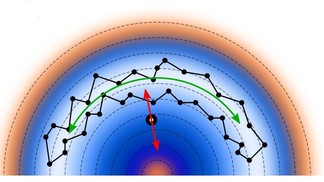Nov 29 2014
The most widely used approximate techniques to simulate quantum dynamical effecst for atomic nuclei (CMD and RPMD) exhibit major artefacts when simulating vibrational spectra of molecular compounds, particularly at low temperature. Recent methodological advances make it possible to fix these problems, extending the range of applicability of these simulations.
 © 2014 EPFL
© 2014 EPFL
The quantum mechanical behavior of light nuclei (e.g. hydrogen) determines significant deviations from classical predictions for the thermodynamic and dynamic properties of materials and molecules. While reliable methods exist to evaluate the time-independent corrections, dynamical properties are much more challenging. Two of the most commonly used techniques (centroid molecular dynamics, CMD and ring-polymer molecular dynamics, RPMD) offer a practical way to approximate quantum dynamics in the condensed phase. Unfortunately, while they generally give reasonable results, when it comes to computing quantum corrections to vibrational spectra they have been shown to exhibit major artefacts, particularly at low temperature and for molecular materials.
In a recent publication, we have shown that these artefacts can be removed by a combination of the ideas behind CMD and RPMD, giving a method for approximate quantum dynamics that can be reliably applied to vibrational spectroscopy in a broad range of conditions. Furthermore, we performed an extensive comparison with other approximate quantum dynamics techniques, that shows that within their range of applicability these methods are consistent with one another. Since an exact benchmark calculation is effectively impossible for condensed-phase systems, this is probably the best assessment of the reliability of these techniques, and shows the way forward to improve accuracy and efficiency.
Source: http://actu.epfl.ch/